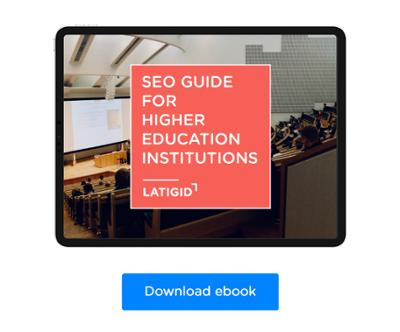
Attracting prospective students to your institution requires a robust digital presence. Higher education SEO (Search engine optimization) plays a crucial role in this endeavor, ensuring that your school's website ranks prominently in search engine results pages (SERPs). At the heart of effective SEO lies keyword research – the process of identifying and targeting relevant search terms that align with your school's offerings and resonate with prospective students' interests.
This blog article delves into the intricacies of keyword research for higher education SEO, guiding you through the steps of identifying the best keywords for your school.
How to use higher education SEO to rank your school?
Using SEO (Search Engine Optimization) for higher education institutions to improve their search engine rankings and visibility is crucial for attracting prospective students, faculty, and staff. Here are some steps you can follow:
Research relevant keywords
- Identify relevant keywords and phrases that potential students and other stakeholders might use to find your school. Use tools like Google Keyword Planner, SEMrush, or Ahrefs to discover high-value keywords.
- Consider long-tail keywords that reflect your school's unique programs and offerings.
Invest time in on-page SEO
- Optimize your website's meta titles, meta descriptions, and headers with the chosen keywords.
- Ensure that your content is well-structured and easy to read.
- Use descriptive alt tags for images and include keywords where appropriate.
- Maintain a responsive, mobile-friendly design to improve user experience.
Develop high-quality content
- Develop high-quality, informative, and engaging content that is relevant to your target audience.
- Create blogs, articles, and resources related to your courses, campus life, and educational insights.
- Keep the content up to date.
Optimize your school for local searches
- For physical campuses, optimize for local searches. Register with Google My Business and ensure your location is accurate.
- Encourage user reviews and respond to them.
Build high-quality and relevant backlinks
- Build high-quality, relevant backlinks to your website. Collaborate with authoritative educational institutions, get featured on education-related directories, or partner with other organizations.
Don't forget technical SEO
- Ensure your website loads quickly. Google favors faster websites.
- Make sure your website is secure with HTTPS.
- Create a sitemap and submit it to Google Search Console.
- Optimize the site's structure for easy navigation.
Optimize your website for user experience
- Optimize your website for user experience, making it easy for visitors to find information and navigate.
- Minimize page load times.
- Ensure mobile-friendliness.
- Use clear, concise, and compelling calls to action.
Use social media to improve SEO
- Establish a strong presence on social media platforms. Share content, engage with your audience, and encourage sharing.
- Use social media to promote campus events, student success stories, and other news.
Analyze SEO performance and make the necessary adjustments
- Use tools like Google Analytics to track your website's performance.
- Monitor keyword rankings, website traffic, and user behavior.
- Adjust your strategy based on the data.
Related article: Increasing Student Enrollment: SEO Techniques for Universities
How to identify the best keywords for your school?
Identifying the best keywords for your school's higher education SEO strategy is a critical step in improving your website's visibility and attracting prospective students. Here's a step-by-step guide on how to find and select the right keywords:
Analyze your competitors' keywords
Research other schools or institutions similar to yours. Identify the keywords they are targeting and ranking for. Tools like SEMrush, Ahrefs, or Moz can help you in this regard.
Focus on the long-tail keywords
Expand your keyword list by considering long-tail keywords. These are more specific and typically have lower search volume but can be highly relevant. For example, "best computer science programs in California" or "affordable online MBA programs."
Use keyword research tools to discover potential keywords
Utilize keyword research tools to discover potential keywords. Google Keyword Planner, Ubersuggest, and AnswerThePublic are helpful tools. Enter your seed keywords and see what related terms and phrases come up.
Find keywords with a high search volume and low competition
Evaluate the search volume and competition for each keyword. Higher search volume keywords are generally more competitive. Aim for a mix of both high and low competition keywords.
Focus on quality keywords, not quantity
Ensure the keywords are highly relevant to your school, its programs, and offerings. Keywords that don't align with your content can hurt your SEO efforts.
Find location-based keywords
If your school is location-specific, consider including location-based keywords, such as "best universities in [your city/state]" or "top colleges near [your city]."
Pay attention to user intent
Consider the user's intent when they use a particular keyword. Are they looking for information, enrollment details, or specific programs? Tailor your content to match these intents.
Monitor and adjust your keywords
Continuously monitor your keyword performance using tools like Google Analytics and Google Search Console. Adjust your strategy based on the data and adapt to changing search trends.
Remember that SEO is an ongoing process, and ranking for keywords may take time. Regularly update and refresh your content, and keep an eye on changing trends and algorithms to stay competitive in the higher education space.
Related article: SEO for Universities: Keyword Research Guide
About Latigid
We are a higher education SEO agency. We help you grow by increasing website traffic, generating more student leads, and closing those leads into enrollment. With a deep understanding of the latest industry trends and best practices, we are well equipped to help your institution grow.
If you are looking for a higher education SEO agency to partner with, check our page to see what we can do for you!
Download our SEO guide and learn how to build a strategy to optimize your Higher Education Institution's website






